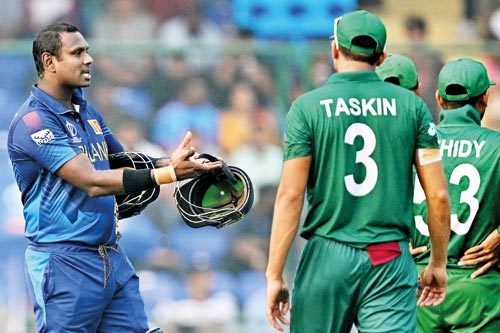Mathews could have avoided ‘Timed Out’ dismissal by alerting umpires
 The Marylebone Cricket Club (MCC) says that Angelo Mathews could have avoided the “Timed Out” if he had alerted the umpires the helmet issue. Mathews became the first in history of international cricket to be dismissed ‘Timed Out’ during their game against Bangladesh last Monday.
The Marylebone Cricket Club (MCC) says that Angelo Mathews could have avoided the “Timed Out” if he had alerted the umpires the helmet issue. Mathews became the first in history of international cricket to be dismissed ‘Timed Out’ during their game against Bangladesh last Monday.
Walking in to bat at the fall of Sadeera Samarawickrema’s wicket, Mathews was getting ready to take guard to face the bowler. But when he tried to adjust the strap of his helmet, it came out in what he said was ‘an equipment malfunction’.
After he was ruled out by the umpire, Mathews pleaded with him and also tried to explain his situation to the Bangladesh skipper, to no avail. Although he could have withdrawn his appeal, Shakib decided to uphold the decision–an atrociously poor tactic from the Bangladesh skipper.
MCC says that the umpires were correct in their decision to rule out Mathews, but Mathews could have avoided the dismissal. The dismissal sparked significant discussion and uproar. Mathews called Shakib’s decision to appeal ‘disgraceful’ in his post-match press conference after the game.
“The key part of the Law, on this occasion, is that the batter must ‘be ready to receive the ball’. Being on the field, or even at the wicket, is not enough to avoid being Timed Out,” the MCC statement stated.
“The batter must be in position for the bowler to be able to bowl inside the allotted time”.
“The umpires determined that Mathews was not ready to face the ball within that two-minute allowance. He subsequently suffered an issue with his helmet, causing further delay”.
“Had the umpires been informed of a significant, justifiable, equipment-related delay within the two-minute allowance, they could have treated it as a new type of delay (as they would when, for example, a bat breaks), possibly even calling Time, allowing for a resolution of that delay without the batter being at risk of being Timed Out. However, it is important to note that both umpires determined the delay came after the two minutes had elapsed, and that Time had not been called before the appeal”.
“Having taken more than 90 seconds to get to the 30-yard circle, Mathews appeared to notice that he was short on time, jogging the final few yards to the wicket. His helmet malfunction has since been shown to have taken place 1 minute and 54 seconds after the previous wicket had fallen. He had not, at this stage, begun to take guard and was not close to being in a position to receive the ball”.
“When the helmet broke, it appears that Mathews did not consult with the umpires, which a player would be expected to do when seeking new equipment. Rather, he just signalled to the dressing room for a replacement. Had he explained to the umpires what had happened and asked for time to get it sorted out, they might have allowed him to change the helmet, perhaps calling Time and thus removing any possibility of being Timed Out”.
“Given that Time had not been called, and that at the time of the appeal more than two minutes had elapsed, the umpires correctly gave Mathews out. In fact, there was no other action for the umpires to take within the Laws of Cricket.”


